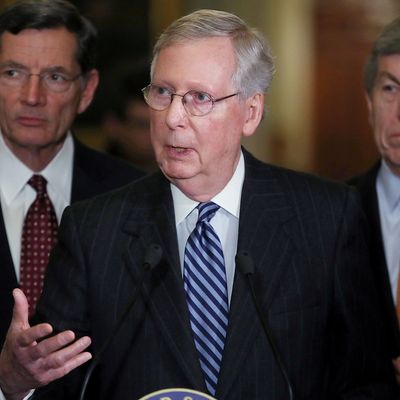
After Antonin Scalia died, in February of 2016, Mitch McConnell justified his decision to blockade the vacancy on the grounds that neither party would approve a Supreme Court justice during an election year. (The truth is that there was simply little precedent for this either way.) McConnell was simply acting on a “principle” that, he explained, had been understood by all sides but never ratified in a formal way.
Sunday, Chuck Todd asked a question that exposed McConnell’s ruse quite elegantly. Why not ratify the principle?
You can see the exchange above.
SENATOR MITCH MCCONNELL: You don’t fill Supreme Court vacancies in the middle of a presidential election. That’s what Joe Biden said back in 1992. And he’s the chairman of the Judiciary Committee.
CHUCK TODD: So is this the policy? Should that be the policy?
SENATOR MITCH MCCONNELL: We knew exactly —
CHUCK TODD: Should that be the policy going forward? Are you prepared to pass a resolution that says, “In election years, any Supreme Court vacancy,” and have it to be the sense of a Senate resolution that say, “No Supreme Court nominations will be considered in any even-numbered year.” Is that where we’re headed?
A good test of any principle is whether the person claiming it is willing to make it apply to all circumstances going forward. If McConnell were willing to make “fill no election-year vacancies” a formal rule, it would hardly prove his good faith — he might have embraced the rule as a post hoc rationale for his power play — but it would be at least consistent with the idea McConnell was acting in good faith. And he would be binding himself, and his party, to the “rule” he forced Obama to follow, that a president may fill only those Supreme Court vacancies that occur during the first three years of a four-year term.
But instead McConnell simply brushed off the idea of making it a rule:
SENATOR MITCH MCCONNELL: Chuck, with all due respect, that’s an absurd question. We were right in the middle of a presidential election year. Everybody knew that neither side, had the shoe been on the other foot, would have filled it. But that has nothing to do with what we’re voting on this year. Why don’t we talk about what we’re voting on this week. And that’s this extraordinarily well-qualified nominee for the U.S. Supreme Court.
So, no rule. McConnell blockaded the Supreme Court vacancy because he had the votes to do it. There’s no principle guiding Supreme Court nominations other than: “Does the president have 50 Senate votes?”
Instead of trying to understand the Calvinball rules, Democrats should work within the order that exists. Which means they have to filibuster Neil Gorsuch, and let McConnell formally eliminate the filibuster for Supreme Court nominations, so that they can confirm their nominees with 50 votes, too.






























